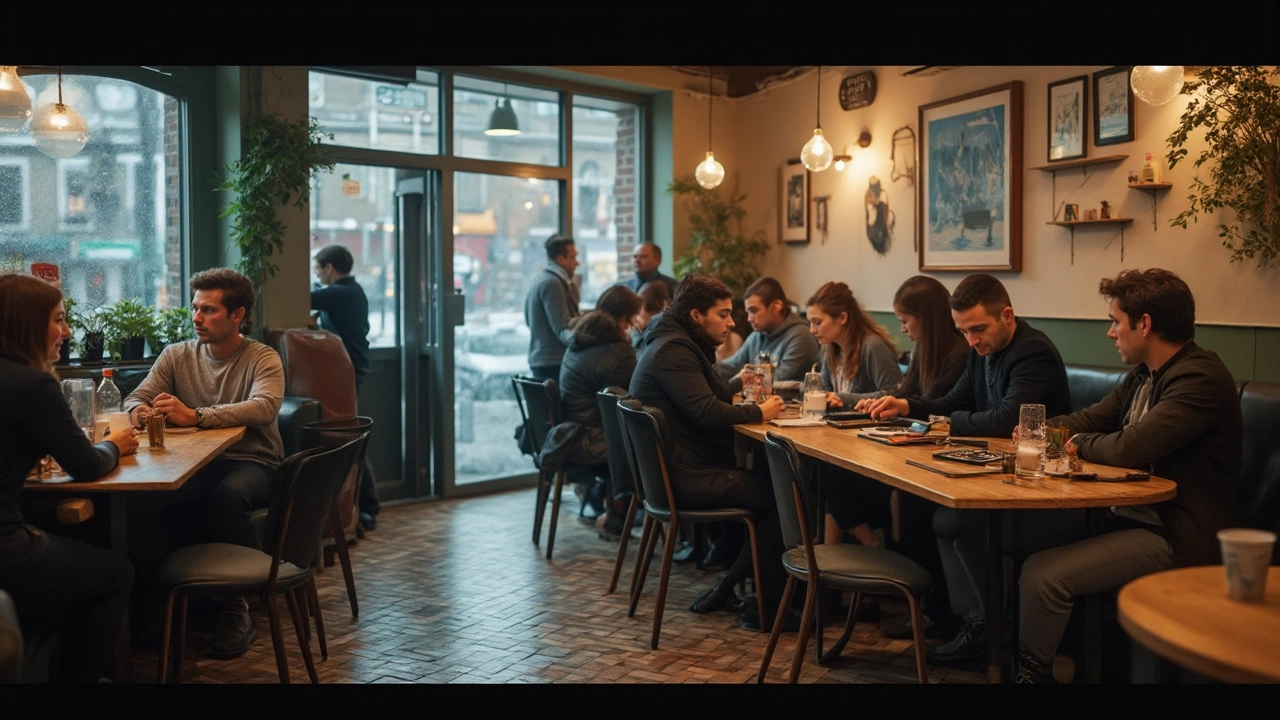Try walking into an office in Dublin or Cork wearing flip flops, and you'll probably get a few raised eyebrows. Flip flops might scream summer at Inchydoney Beach or remind you of last year's trip to Bundoran, but at work? Not so much. In Ireland, there's a good reason you don't see them in workplaces—even when the mercury dares to edge over 20°C.
It’s not just old-fashioned rules from HR. Most Irish workplaces have to follow strict health and safety codes. If you’re serving coffees in Bewley’s or stacking shelves at Dunnes, open-toed shoes are a real no-go. One spill in a café or a box landing on your foot in the storeroom, and those flip flops aren’t going to help you. Even in offices, people worry about slips on wet floors, stubbed toes, or rushing for the fire exit in an emergency.
- Flip Flops and the Irish Workplace
- Health, Safety, and Common Sense
- The Irish Weather and Office Fashion
- Alternatives That Actually Work
- Stories from Irish Workplaces
Flip Flops and the Irish Workplace
It’s not unusual for people to wonder, “Why are flip flops banned at work, even when it’s roasting outside?” You’ll spot them at Rosslare Strand, but not in Irish boardrooms. A quick look at most company dress codes—from HSE clinics to tech startups in Dublin Docklands—shows a strict no flip flop rule. It’s not about stifling your style; it’s about practical concerns and Irish work culture.
In Ireland, most employers expect people to wear closed-toe shoes in any professional setting. According to IBEC (Irish Business and Employers Confederation), workplace appearance matters, both for health reasons and company image. For example, Eir’s office handbook says that footwear must be “safe, presentable, and appropriate to your role”—and yes, they mean no flip flops.
Certain industries set the bar higher. Retail chains like Musgrave or Tesco won’t let staff near the floor in flip flops due to the sheer number of accidents involving spilt goods or foot injuries. In hospitals and hospitality, open footwear equals “health and safety risk”—a phrase you see everywhere, from Health and Safety Authority (HSA) guidelines to job contracts.
Here’s a quick look at why flip flops are off-limits in most Irish workplaces:
- Health and Safety Authority (HSA) guidelines: State that staff must have feet protected against injuries and falling objects.
- Professional image: Companies want a tidy, trustworthy vibe to clients and customers.
- Irish weather: Even in June, you might get caught in a downpour on your lunch break—flip flops plus wet granite never mix well.
This table sums up what big Irish employers say about flip flops at work:
| Company/Industry | Flip Flops Allowed? | Main Reason |
|---|---|---|
| HSE Hospitals | No | Infection control, injury risk |
| Tesco Ireland | No | Health and safety, slips |
| Dublin Tech Offices | Rarely | Dress code, professionalism |
| Coffee Shops (Insomnia, Bewley’s) | No | Hot liquids, spills |
So in the Irish workplace, it’s not just “because we always did it this way.” It’s about keeping people safe and helping everyone look like they’re ready for the job—rain or shine.
Health, Safety, and Common Sense
The main reason flip flops aren’t allowed in most Irish workplaces is simple: they’re risky and just not practical. Rules from the Health and Safety Authority (HSA) in Ireland make it clear that employers have to manage risks for everyone, including things as basic as work shoes. Flip flops leave your toes exposed and are easy to trip in. Ask anyone working in a busy shop, like Tesco or SuperValu, and they’ll tell you it’s just not worth the hassle—or the sore toes.
You might think, “What’s the worst that could happen?” Well, here are some problems people have actually run into while wearing flip flops at work:
- Slips and trips on wet floors, especially all the rainy days we get in Ireland.
- Dropped items—whether it’s a laptop bag in the office, a pint glass in the pub, or a heavy box in a warehouse, your feet just aren’t protected.
- Banged toes on desks, trolleys, or doors because you’re not covered.
- Emergency situations—imagine having to leave the building quickly and your flip flop snaps, or you slip on wet stairs outside.
Here’s something else—a lot of Irish insurance policies actually include clauses about work shoes and proper footwear. If you end up hurt because you wore flip flops against the rules, you might not get covered, and your workplace could be in for a headache too.
Just to show how often these problems pop up, here’s a quick snapshot of workplace foot injuries related to unsafe footwear from one Irish study in 2022:
| Type of Incident | Reported Cases (2022) |
|---|---|
| Trips or slips (all footwear) | 1,320 |
| Injuries from dropped objects | 945 |
| Incidents tied to open-toed shoes | 512 |
This isn’t about being strict for the sake of it. Employers in Ireland have seen real accidents. Protecting workers means making smart calls about what to wear, especially when something as simple as a pair of flip flops could land you flat on your face.

The Irish Weather and Office Fashion
If you know anything about Ireland, you know we love to talk about the weather. It’s part of daily life, and honestly, it plays a big part in how people dress for work. Even on a so-called warm summer day in Galway or Limerick, it’ll probably lash rain at least once. Streets will be slick, and you’ll want solid footwear, not flip flops that turn pavements into slip’n’slides.
Most Irish offices lean towards business casual or smart-casual styles, partly because the weather just isn’t suited to open-toed shoes. Dublin’s office crowd swaps sandals for brogues or decent trainers, because nobody wants wet, muddy feet and freezing toes when the weather shifts on a dime. You’ve probably noticed stores like Arnotts or Marks & Spencer barely bother stocking flip flops for workwear—they focus on practical, close-toed shoes you can depend on in the rain and wind.
Here’s a quick breakdown of why work shoes in Ireland matter so much:
- Protection: Random puddles, puddles from last night’s downpour, and things like gravel or debris—flip flops offer basically no defence.
- Warmth: Even in July, mornings can be chilly and office heating isn’t always perfect. Covered shoes just make more sense.
- Practicality: Getting the Luas or the bus in Cork, dodging traffic, or walking across wet pavements—nobody wants to do that in flip flops.
Fun fact: According to Met Éireann, Ireland gets rain on about 151 days per year in Dublin and over 225 days in parts of the west. So unless your workplace is a tiki bar on Kilkee beach, you’re better off sticking with shoes that can survive a surprise shower. Save the flip flops for the rare sunny weekends, not the office dress code Monday to Friday.
Alternatives That Actually Work
If you're missing the breeziness of flip flops at work, good news—there are options that won’t get you funny looks or chats from HR. Irish shops have plenty of comfy, practical shoes that tick all the boxes for safety and work dress codes.
For office jobs in Dublin or Galway, leather loafers are a no-brainer. They look sharp, don’t squash your toes, and you can wear thin socks or footsies on warmer days so you don’t roast. Smart trainers are catching on in tech companies—especially black or navy ones from brands like Dubarry or Skechers. Just keep the neon runners for Sundays at Phoenix Park.
Working retail in places like SuperValu or pharmacies? Black slip-resistant shoes are nearly always required. Dunnes, Clarks, and Ecco do excellent, reliable pairs. For health workers, HSE guidelines favour closed toes and good grips, so think breathable runners or sturdy clogs.
- Ballet pumps – great for summer, especially ones with padded soles from Penneys or Marks & Spencer.
- Boat shoes – popular everywhere from Cork to Sligo for a reason: comfy, versatile, and look relaxed but neat.
- Ankle boots – perfect for when Irish weather turns moody (which is, let’s be honest, most weeks of the year).
If you want to see what’s actually selling well in Ireland, check out the top five work-appropriate shoes spotted around the country last spring:
| Brand | Type | Where Popular |
|---|---|---|
| Clarks | Loafer | Dublin offices |
| Dubarry | Boat shoe | Cork tech hubs |
| Penneys | Ballet pump | Retail and admin in Limerick |
| Skechers | Smart trainer | Start-ups nationwide |
| Ecco | Lace-up | Mixed city offices |
Stick to closed-toe, non-slip, and neat-looking shoes, and you’ll dodge most complaints and health risks. And if you really miss the fresh air on your toes, stash your flip flops under the desk for quick lunchtime walks by the Liffey or Salthill—just swap back before you clock in.

Stories from Irish Workplaces
If you’ve ever wondered whether this flip flops rule is just for show, ask anyone working in Irish offices, cafes, or shops. They’ll have stories. For example, a manager at a Centra in Galway had to send home a summer temp who showed up in rubber flip flops, thinking a heatwave was a free pass. When a Coke bottle slipped from a shelf and shattered, everyone understood why that policy exists—bare toes and broken glass aren’t friends.
Irish hospitals also make it clear that open-toed shoes aren’t allowed, even for admin staff. One nurse from St. Vincent’s Hospital mentioned how quickly policies changed after a colleague stubbed her toe on a crashed meds trolley. These stories aren’t just about looking smart; safety is at the heart of it.
There’s also the case of a Dublin tech firm that tried “casual Fridays,” but had to clarify rules when someone wore beach flip flops. HR had to step in when another member got a minor cut after tripping near the printer (spilled tea on a tiled floor did the trick). No one expected drama from a footwear choice, but there you go.
Even retail giants like Penneys (Primark) have the same story. Staff dress codes specifically bar flip flops and other open-toe shoes, explaining it every summer. It’s not rare to hear about workplace accidents that could’ve been a lot worse if toes hadn’t been covered up.
Here’s a quick look at some real situations reported by Irish employers:
| Workplace | Incident | Outcome |
|---|---|---|
| Café in Limerick | Hot coffee spill | Minor burns on exposed foot |
| Dublin Office | Wet floor slip | Sprained toe |
| Retail in Cork | Box dropped | Bruised foot, HR updated shoe policy |
If you’re new to the Irish job market, don’t assume your favourite work shoes from your gap year travels will cut it. Safe, closed-toe shoes are expected, and for good reason—these stories show why those rules aren’t changing anytime soon.
